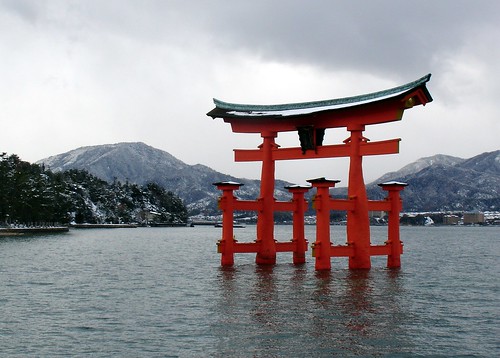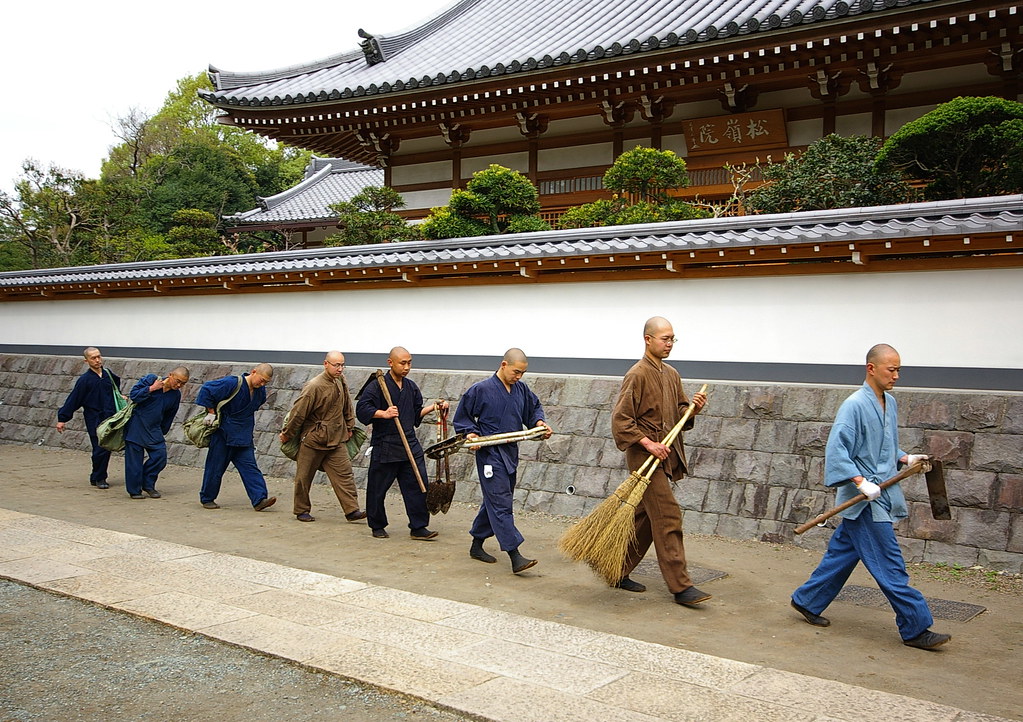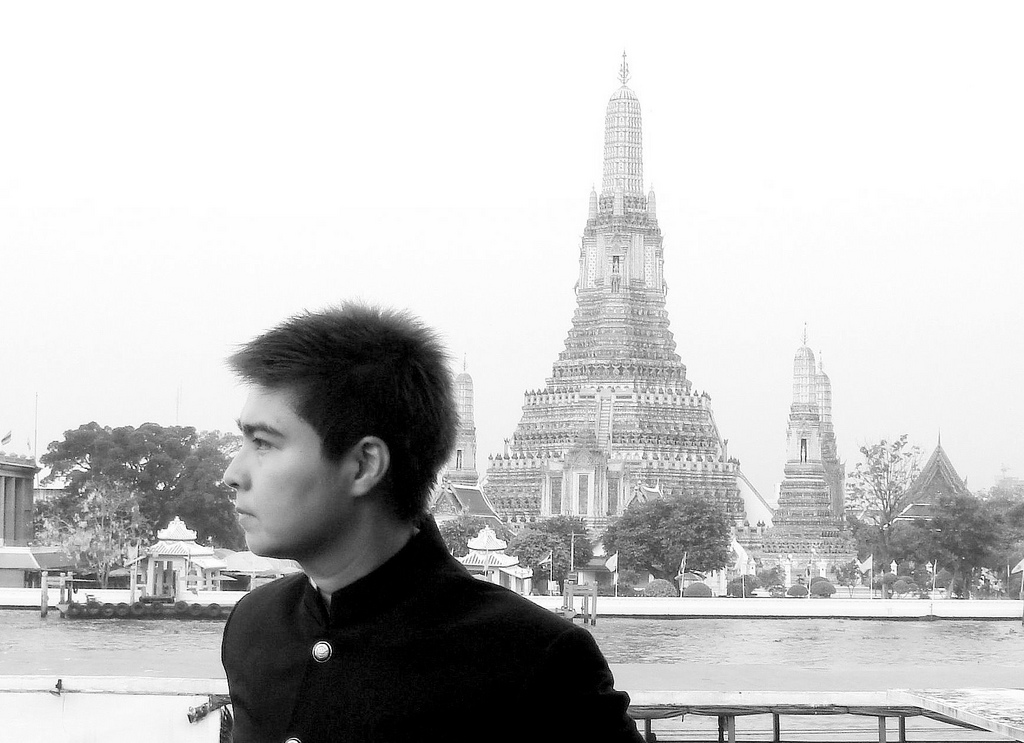The return of Visakha Bucha day this year is quite timely. It provides us the much needed opportunity to stop and reflect about life. Maybe the story behind Visakha Bucha Day will enable us to see things in perspective so that the hatred and anger we can feel in the air among different factions will eventually fade away.

Photo courtesy of Bangkok Post
The reason the author believes so is because, if we look into the very heart of Visakha Bucha, which is arguably the most important of Buddhist holidays, we will see that it is all about love. Surprised? Read on and discover why Visakha Bucha should also be remembered in association with love.
First, let us ask ourselves what we know about Visakha Bucha.
Textbook interpretation
If we had gone to a school that teaches the common curriculum from the Thai Education Ministry, we would probably have been taught that Visakha Bucha falls on the full moon of the sixth lunar month and that it commemorates the dates of Lord Buddha's Birth, Enlightenment and Mahaparinibbhana.
Such is the textbook version of the meaning of Visakha Bucha. Unfortunately for most of us, this version remains the only source of our interpretation of this most important Buddhist holiday.
But is there any other interpretation of Visakha Bucha besides knowing what date it falls on or what occasion it commemorates? Certainly. And the key is to get to know more about the man behind the holiday.
The man behind the holiday
If we are to be honest with ourselves, we will have to admit that we Thais seem to take the arrival of Lord Buddha for granted. In a religion known for its understanding of reincarnation and the law of cause and effect, isn't it a bit odd to think that the birth of Buddha is something that just happened?
Of course, we may have heard of the last 10 lives as a human being of Lord Buddha, known as jataka. The 10th reincarnation, Phra Vessantara, is perhaps the best known. It depicts the life of Prince Vessantara who gave away all his possessions as he was perfecting the dana parami, or the virtue of unconditional, selfless giving.
The 10 jataka depict the perfection of different virtues which in turn help purify one's karma, enabling one to reach Enlightenment.
But, as mentioned earlier, the effort to perfect the 10 Perfections did not just ''happen.'' For a karma to bear fruit, it has to start with an intention. Therefore, there had to be a beginning somewhere where a determined decision was first made. When was it? And, more importantly, who was it?
The man behind the decision
Before we learned who the person was and the whole story behind it, let us first contemplate this metaphor.
Imagine you are standing at an exit of a burning house. In fact, you already feel the intense heat of the scorching flames on your body. The next second you realize that your hair is now on fire. You know that all you have to do is to dash out the door with all your might and you will be saved.
Yet, you hear crying voices behind. You look back. There, on the ground floor behind you, are people engulfed in flames, howling eerily for help. They could not make it out by themselves either because their limbs are trapped or they could not open their eyes due to the extreme heat. You know that, being not too far from the exit themselves, they, too, could be saved.
What would you do?
This was exactly what happened to an ascetic named Sumeth. Born during the time of another Buddha called Dipankara, Sumeth realized that life is in fact a series of sufferings, not unlike being in a burning house. That was why he left his comfortable, worldly life to devote himself to rigorous training to try to reach the end of suffering.
One day, as he passed by one town, he heard that Dipankara Buddha was coming. Elated, he dedicated himself to help the townsmen build a road to welcome the Buddha. Sumeth knew well that, like many people during his time, if he got to meet the Buddha and devote himself as a disciple, he would soon become Enlightened, reaching the end of all his sufferings.
Yet, as Dipankara Buddha was approaching, the road was still unfinished, leaving a distance of around a body's length that was wet and full of mud and dirt. Throwing himself down, Sumeth the ascetic bravely invited Dipankara Buddha and his Enlightened disciples, numbering in the thousands, to walk on his back to the other side of the road so that the mud would not soil their feet and robes.
As Dipankara Buddha was walking over Sumeth's back, he became aware of the young man's wish. Instead of finding the easier, faster way out of the samsara by wishing for Enlightenment in that very life, Sumeth made a wish that he, too, would become a Buddha one day so that he could help as many people as Dipankara Buddha did, knowing all too well that he had to endure enormous suffering in countless lifetimes to achieve his goal.
Dipankara Buddha looked into the future with his mental powers and predicted that Sumeth would indeed one day become a Buddha like him, a sammasambuddha. ''Freed from human existence, you will become an effective teacher, for the sake of the world,'' Dipankara Buddha told Sumeth.
The three types of Buddha
But what is the difference between a Buddha and someone who is Enlightened? After all, didn't Prince Siddhartha became Buddha because he was Enlightened?
The answer can be found in the three types of Buddha. The first type, sammasambuddha is the rarest and requires the highest effort and the longest period of endurance. Born when there is no dhamma teaching in the world, they become En lightened by their own effort and inherent wisdom. A sammasambuddha then goes on to teach others how to be Enlightened like him.
The ability of a sammasambuddha to come up with the right ''curriculum'' to guide others to nirvana is an extremely rare gift. How rare? According to the Pali Canon, it sounds like a sammasambuddha comes by only once in an eon. The present Buddha that we know needed as long as four asamkhya and a hundred-thousand great kalpa to complete his 10 Perfections.
To write the time unit of one asamkhya is to write the number 1 then add 140 zeros after it. Four asamkhya equal one great kalpa. A great kalpa is believed to equal 1.28 trillion years. This is why we should not take the arrival of a sammasambuddha for granted. We are very blessed to be born when there is one around to teach us.
The second type of Buddha is called a paccekabuddha. While they can attain Enlightenment by themselves, they do not teach. If they do, they may only teach about virtuous conduct but they cannot guide people towards Enlightenment. They do not have the ability to do so.
The third type is called savaka-buddha, or an Enlightened disciple. The main difference between this type of Buddha and the first two is that they could not become Enlightened by themselves. They required the guidance or teaching of a sammasambuddha. However, once Enlightened, they may also lead others to Enlightenment as well. But they may not be able to reach out to all types of people as a sammasambuddha could, though. In other words, their teaching would be most beneficial to disciples with similar psychological profiles. A savaka-buddha is better known in Thailand as an arahant.
Sumeth the ascetic could very well attain the third type of Buddhahood right in the life time that he met Dipankara Buddha, but he chose to forego it for the benefit of more people in the future. Becoming a sammasambuddha, while requiring much more effort and time to endure suffering, means he would be born when there is no Buddha or the teaching of dhamma. It would be a time that he could make himself most useful to the world.
After Dipankara Buddha's entourage had passed, Sumeth immediately went to work. He contemplated carefully the route to Buddhahood of all the previous sammasambuddha. Realising that he needed the 10 Perfections, Sumeth made a vow to himself to go for that goal in every lifetime, no matter how hard it would be, no matter how long it would take. He would never, ever give up.
We already addressed the length of time that our current Buddha had to accumulate his 10 Perfections. But how hard could that be? Hasn't Buddha always been born in a blessed and comfortable environment? Hasn't he always been born into a royal family, like most of the jataka seem to indicate?
That certainly was not the case. Lord Buddha himself told many stories of when he was born into a humble family or even as different kinds of animals.
And it was not just a typical humble livelihood that Lord Buddha had to endure. The path to becoming a sammasambuddha requires one to literally sacrifice everything one has, including one's life, for others. Lord Buddha himself compared that the number of lives that he had to sacrifice to help others were more than the number of all the coconuts in the world combined. He was using the coconut as the visual comparison of his head being severed as he gave his life for others.
It must have been love
Those selfless, ultimate, repeated sacrifices are the ''love'' part in Visakha Bucha. If it was not love, what else can it be? From forgoing one's Enlightenment opportunity to facing suffering in countless other reincarnations, the mind that would become our Lord Buddha held on to that love and never gave up.
Therefore, on this Visakha Bucha Day, let us not think of it merely as what it is, but why it happened. It was because of love towards us that Lord Buddha kept accumulating the 10 Perfections so that he would be born as the man who would become Buddha. Similarly, it was because of love towards us and all sentient beings that Lord Buddha became Enlightened.
If that love was not powerful enough, the then-Prince Siddhartha would not have tried so hard in every imaginable way to the point that he almost lost his life due to the severe demands he placed upon himself in order to attain Enlightenment.
Arguably, it is also because of love that Lord Buddha chose how he would die. By making his dying moment a public one, Lord Buddha knew that he could impart life's most important lessons to all who were present there and to us here in the future. Lord Buddha's final lesson, arguably summing up all his teachings, was that nothing is permanent, not even the existence of a sammasambuddha. And because of that, we should diligently practice mindfulness in everything we do so that we, too, will be able to get out of suffering.
Lord Buddha's love in today's context
Today, as we celebrate his life, let us look at him the way we have never looked at him before--as a flesh-and-blood human, a son, a husband and a father who had unconditional love for all. Lord Buddha once said that his love for his son, Rahul, and his nemesis, Devadatta, is the same. He wished that both of them could be free of all suffering.
Could we use this important day, then, to ''upgrade'' our minds in such a way that we could give love and compassion to all, even to those who do not always agree with us? Can we look them in the eyes and wish that they, too, be free of suffering?
After all, we are but fellow sufferers in this endless samsara. This very life we live in is indeed such a tiny time span compared to the eons we have been born and reborn again in this cycle of suffering. Instead of filling this time span with hatred and anger towards one another, shouldn't we spend time trying to help each other to the best of our ability so that we all would be released from suffering together?
Eons ago, a man at the exit of a burning house, the samsara, looked back and saw us trapped inside, howling for help. Ignoring his own safety and well-being, the man dashed back to reach out to save us. Naturally, if we don't extend our hands to reach his, we would not be saved and probably face a slow, torturous death. The ball is now in our court. That man did try his best and he did save many already. It is up to us, really, whether we want to stay in the burning house forever or be free, so that we, too, will be able to reach back and help others.
The road to becoming a sammasambuddha was not a bed of roses. It was a true labour of love right from the beginning to the very end, eons later. Therefore, let love and compassion reign this Visakha Bucha Day. Not only because it is the most suitable homage we can pay to the man behind it all, but also because of the fact that the path to the end of all suffering of every human and sentient being starts with love.















